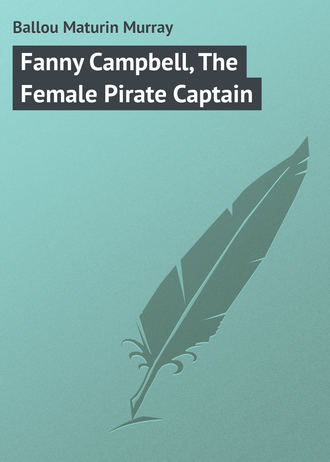 полная версия
полная версияFanny Campbell, The Female Pirate Captain
He was dressed in blue sailor’s pants, and a short Pea Jacket descending about half way to the knee, within the lining of which a close observer might have seen a brace of pistols and the silver haft of a knife, so designed as to cut at both sides while it was bent like the Turkish hanger. As he waved his tarpaulin hat for a signal to the brig, the night breeze played with his short, curly hair, throwing it in dainty curls about his forehead, which, protected by the hat so constantly worn by the seaman, was white as alabaster, and showed in singular contrast with the browned cheek and open neck. – Altogether you would have pronounced him a king’s officer in disguise.
The boat received him, and he was soon on board the brig.
‘Well, Mr. Channing,’ said the captain of the vessel, who met him as soon as he arrived on board, ‘have you engaged the man whom you promised to get for me yesterday?’
‘Yes, sir.’
‘When will he join us? we sail with the morning tide you know.’
‘He will be on board to-morrow morning in good season, sir.’
‘Don’t let him fail, sir, for it will completely man us into our single hand, Mr. Channing. It does seem a pity to sail without the full complement when we have so nearly got it.’
‘I’ll see this man again to-night sir, and make sure of him.’
‘That will be well, sir,’ replied the Captain.
This conversation was held on the quarter deck of the brig Constance which was of about four hundred tons burthen, and a most beautiful specimen of the naval architecture of the day. She was bound ostensibly to the West Indies, but the plan was (as Mr. Channing told Jack Herbert that night) that after touching there she was to proceed to England.
She was well armed carrying a long tom amidships, and half a dozen six pounders, and a crew when her complement was complete, of twenty men before the mast. She was designed as a strong armed trader, and having letters of marque, she was expected to take any vessel belonging to the enemies of England (under whose flag she sailed) provided she was strong enough. Her commander was a tyrant in his disposition and much addicted to the intemperate use of spirituous liquors.
His first mate was a weak, imbecile young man, put on board originally as a sort of supercargo, by the owners, being a son of the principle share holder. The third officer was Mr. Channing whom we have introduced to the reader, and who appeared to be the only person on board worthy of trust as an officer. The captain trusted almost entirely to his first mate who was also inclined to throw all responsibility upon his second, as we shall have occasion to see.
The next morning Mr. Charming called on the poor Irishman as he had promised to do. He learned that the poor woman his mother, had expired during the night, and he found her son with his face buried in his hands, the very picture of honest grief.
‘I condole with you my good man,’ said Channing, ‘but you should remember that your mother has gone to a better world, where she will know no more want, no pain nor hunger – “where the wicked cease from troubling, and the weary are at rest.”’
‘Do you belave that?’ asked Terrance Mooney.
‘Most certainly, the humblest of God’s creatures is his especial care, and he will gather all his children home in due time,’ said the mate of the brig to the weeping son of the deceased.
‘And no purgatory nather.’
‘If there be any purgatory, my good man, it is here on this earth where there is so much sin and consequent misery.’
‘Arrah, that’s consoulin to be sure if its all true, but the praist tells a mighty dale about that place.’
‘If he would preach more about the love and kindness of our heavenly father, and less of these imaginary places, he would serve the cause of his maker much more faithfully, and lead more sinners to repentance,’ said Channing.
‘Would’nt I be happy if I thought the ould lady had gone to Paradise to live wid the saints?’ said Terrence.
‘Believe me, my good fellow, she’s safe in the hands of the wisdom and power that made her.’
‘That’s consoling to be sure, but here am I, Terrence Moony, wid no mother at all, sure what’s to become of me?’
The thought struck Channing that it wanted yet one man to complete the complement of the brig.
‘How would you like to go to sea with me for good wages and comfortable living, hey Terrence?’ asked the mate.
‘Why there’s nothing to kape me here to be sure, but to see the ould woman dacently buried. When does your honor go to sea, if you plase?’
‘This morning.’
‘Right away is it?’
‘With the ebb tide.’
‘Arrah, that’s soon enough to be sure, could I get my friends to dacently bury her now, but thin I hav’nt the money.’
‘Here’s a few dollars if that will do it,’ said Channing handling Terrence some money for the purpose.
‘Do it, is it? won’t they have a “wake” out of it, and I’ll be far away at the same time they’ll be ating at it.’
‘Well, you must make haste, my man.’
‘Ye’s all ginerosoty, yer honer. I’ll jist fix it all, and thin I’ll follow yees to the end of the earth.’
And Terrence Mooney did arrange for the funeral of his mother, and after a few bitter expressions at parting from her body, he went on board the brig, when he shipped for the voyage to the West Indies.
Mr. Channing and Jack Herbert were on board in due season, and with the morning tide the brig hoisted her anchor, and spreading her white wings, stood out to sea. The bright sun shone gloriously upon the green islands that dotted the harbor in every direction, they were much larger then than now, and indeed one or two small ones have disappeared entirely. Seventy years of swift running tides have greatly reduced them in point of size, but not in beauty, for they still give a picturesque loveliness to the Bay that a painter’s taste could not improve. St. George’s flag floated from the topmasts of a dozen men of war, which lay at anchor in the harbor, and floated from a number of lofty points in the town. Scarcely had this scene disappeared from the eyes of the crew, when they were summoned aft by the captain, where he made them the following brief and very pertinent speech, it was characteristic of the man.
‘My men, when I’m obeyed quick and well I’m a pretty clever sort of a man, but when I’m thwarted, why then I’m h – I! so look out. I’m captain here, and will be obeyed to the very letter. You’ll know me fast enough when any of you cross me. – There, that will do – now go forward.’
‘Divilish little Christian is there about him,’ said Terrence Mooney to his comrades, ‘and is it bastes that we are entirely?’
The sailers did go forward, but they muttered among themselves that they knew full well what sort of a man the captain was, one of the devil’s own begetting, and the poor fellows made up their minds to plenty of blows, and little duff.’ The captain soon disappeared below, and in an hour or so afterwards was half intoxicated and asleep.
The first mate for some days attended promptly to duty, but he soon began to ‘shirk,’ and the general direction and sailing of the brig as a matter of course fell upon Channing, the next in command. – This none regretted, for although his orders were given in a prompt and decided tone, and implicit obedience was exacted, yet was his voice musical and kind, and his orders were almost anticipated by the promptitude of the willing crew, who soon came to love him for the generous consideration he evinced for their good and that of the vessel.
A little incident occurred on board of the brig, when eight days from port, which showed who really commanded the crew of the Constance. The captain passed the most of his time in the cabin, smoking, drinking, and dozing away the time, and thus kept but a slack look out upon the men, notwithstanding his boast at the outset. – One afternoon when a pretty stiff breeze was blowing from the North West, the mate lay sleeping in his state room leaving the sailing of the brig to his second, while the captain was occupied much the same as usual. After a while the mate awoke and came upon deck. Wishing to make up for his manifest negligence by some appearance of care at least, as he came up on deck he cast his eye aloft, and ordered a reef out of the fore and main topsails.
The crew looked at one another in astonishment, for it was evident to the poorest sailor on board that so far from its being proper to put the brig under any more sail, it would have been more prudent to have furled the canvass in question altogether. – The wind had blown fresh all day, and now as the afternoon advanced, the night breeze began to add its power to the wind that had blown through the day, until the brig under the two sails mentioned, and those close reefed, leaped over the waves with the speed of a racer. The mate repeated his order a second time, but there was no response from the crew, who slunk away in various directions with sullen countenances.
‘Mr. Channing,’ said the mate, ‘these men are absolutely mutinous, sir.’
‘I see it, Mr. Bunning.’
‘What’s to be done, sir?’
‘Do you still think it proper to make that sail?’
‘It was the order, sir.’
‘Forward there,’ said Channing in a tone of voice pitched perhaps a key lower than was his natural voice, ‘lay aloft and shake out the reefs from the fore and main topsails, cheerily men, away there, with a will, I say.’
The order had scarcely left the mouth of the second mate before the agile forms of a score of men sprang lightly up the shrouds to obey the mandate.
‘How is it the men obey you and not me, Mr. Channing?’
‘Mr. Banning, it is blowing pretty fresh as you must see,’ was the reply, and perhaps it is rather crowding the brig to make this new sail just now, but if you think it proper, the men must do it, sir.’
‘Well, put her under what canvass you like,’ said the mate to Channing as he left the deck, not a little mortified at the scene that had just taken place.
Channing rather pitied than blamed his fellow officer, and therefore was determined at any rate that his order should be obeyed; besides, he was not a person to relax the reins of discipline although much loved by the crew. He saw the impropriety of putting the brig under more sail as well as the crew, but it was not for him or them to judge in such a matter when there was a superior officer on deck. The error was soon remedied by the good judgment of Channing, and the beautiful vessel buffeting the waves still sprang on her course in safety, under the care of a higher power than any on board, bending gracefully under the influence of the freshening breeze.
CHAPTER III
THE RUSE OF THE CAPTAIN, MUTINY! A NEW COMMANDER. ATTEMPTED ASSASSINATION. A FATAL AND BLOODY SCENE. SAIL HO! AN ENEMY. THE PINE TREE FLAG. THE SEA FIGHT AND THE VICTORYAll the crew of the brig Constance, save the captain, first mate and cook, were Americans, if we except Terrence Mooney who was one at heart, and the captain had managed to have this the case in order that he might take them home to England and receive the bounty money upon each one who would be immediately pressed into the British Navy. He had arrived at Boston but a few weeks previous to his sailing upon the present voyage with a crew of his own countrymen, upon whom he had also played the same trick, by delivering them over to the King’s ship that floated in Boston harbor, It was a hard fate to most of them who would as willingly have been immured in the walls of a prison. They told as a matter of consolation that they would not have to serve but about three years! And this, to men who had left families at home, to whom they had expected to return in a few weeks. It is a foul deed to impress a man into any duty, and foul must be the service that requires the exercise of such deeds.
The captain of the Constance was enabled to obtain a sufficient number of Americans to man his craft, by offering very high wages, and under the pretence of making a voyage to the West Indies only and back, for they knew not of his treachery to his former crew. The plan of the captain in the present case was, after reaching his port in those latitudes, to pretend to have ascertained that which rendered it absolutely necessary for him to proceed immediately to England, intending to pacify the crew by the promise of immediate return and increase of pay. This piece of treachery the captain thought was known only to himself and his first mate, but he was mistaken for Channing had announced to Jack Herbert as the reader will remember, the destination of the brig, on the evening previous to their sailing from Boston. Thus it was evident that Channing fully understood the proposed treachery and that he designed to turn it to good advantage, or else he would not have shipped on board knowing that which he did.
The North American Colonies were then at war with the mother country, the brig was a British brig, and Channing was an American. His heart beat warmly for the cause of his country, he looked about him, there were twenty men, all save one, his fellow countrymen, about to be betrayed into the hands of their enemies. His mind was determined, and he said within himself this shall not be! He had fortunately overheard the captain and the first mate congratulating themselves on having so nearly obtained their full complement of men on the day previous to the enlistment of Herbert, and thus had he become master of their secret purpose of treachery.
Already had the brig changed the chill northern blasts for the sunny breezes of the South, and she was, according to the reckoning of Channing, about a day’s sail from Cuba, when he determined that the good brig Constance should change hands, and from a British, become an American craft. It was a bold undertaking; the two greatest sins that a sailor is taught to dread, Mutiny and piracy, were staring him full in the face. He did not design to implicate a single member of the crew in the transaction, but resolved to make the attempt to gain possession of the vessel, alone and unassisted. He had two reasons for this: first, he was too good a disciplinarian to tamper with those below him, and he foresaw that if he should once become familiar with them in a matter of conspiracy, he could no longer command their respect. Then again he felt that he had no right to draw them into the danger incurred, and that it would be far more noble in him to accomplish that which was to be done with his own hands – after that, if he proved successful, those could join him who felt disposed. Early one morning, Channing went down into the captain’s cabin, whom he found just rising from his bed. Stepping to the table he possessed himself of the brace of pistols that lay upon it, and also the cutlass that hung from the wall; then turning to the captain who was hardly yet awake, he said: ‘Captain Brownless, you are my prisoner!’
‘Sir?’ said the astonished commander. ‘You are my prisoner!’ repeated Channing. ‘Mutiny?’ enquiringly put the captain, a dark scowl gathering like a cloud over his bloated, bacchanalian countenance. ‘Yes, mutiny if you please.’
‘By Heaven, but we will fight for it,’ said Captain Brownless, who was a man of some bravery – brave as the animal or wild beast is brave in defending its own, not nobly so.
‘Stay, sir,’ said Channing, coolly cocking a pistol and presenting it at the captain’s breast. ‘If you attempt to leave this cabin, you are a dead man!’
The captain sank down upon a chair in despair. ‘Be peaceable, sir,’ said Channing, ‘and I will pledge myself that no harm shall befall you personally; but seek to make even a breath of noise, or resistance, and you shall be sent into eternity with all your sins upon your head.’
Channing then proceeded to the cabin of the second officer, but not until he had locked the captain securely in his own apartment.
‘Banning, I regret to say you are my prisoner,’ said Channing to the mate, after securing his arms as he had done the captain’s.
‘Hey? what, mutiny?’ ejaculated the terrified man. ‘Yes, Banning, and piracy if you will.’
‘Oh! spare my life,’ said the trembling coward. ‘No danger, sir, if you remain quiet.’
‘Oh, I’ll do nothing,’ continued the mate. ‘Show your obedience by being quiet now.’
Channing then locked Banning in his state-room, and ascended to the deck. He had left Jack Herbert at the helm and in charge of the ship; he now sent him forward to order the crew aft to where he stood, as he wished to speak with them.
‘Well my boys,’ commenced Channing addressing the crew,
‘I have got some news for you. The captain is disarmed and locked in his cabin as my prisoner; so is Mr. Banning, the mate.
I have done this because I’m determined to have possession of this brig myself. She’s a British brig, you are all, or nearly so, Americans; I am also an American, and this brig must belong to Americans. I am alone responsible for what has been done. You are now without a captain. How many of you will ship under me?’
‘All – all,’ was the response from every quarter.
‘Thanks to you, my men. I shall leave it to Mr. Herbert – mark me, it is Mr. Herbert in future – to tell you of the treachery that it was proposed to play off upon you. He will also be my second in command, and you will obey him as you would do and have ever done me. I shall alter the course of the brig and stand for St. Domingo, where I shall land the captain and mate, and those of you who do not feel inclined to join me. Then I am bound on an expedition to free a couple of Americans from a Spanish prison. After that, why, we will see what next – perhaps a few prizes or something of that sort.’
Jack Herbert had already told the men of his confinement and escape from prison at Havana, and of the present confinement of Lovell and his comrade there, and when they heard their new captain express his determination to release them if the thing was possible, they joined unanimously and heartily in the enterprise.
‘Hurrah, hurrah,’ said they altogether, it being the only way in which they could express their satisfaction.
‘Now mark me, men,’ said Channing, ‘I think you all know me without my giving you such a speech as we had on leaving Boston harbor. I am captain, that you all acknowledge, and that I am one who will be obeyed, I believe you all know, as well as that I have the comfort and good of every man of you at heart. These I shall consider as long as we sail together, this I think you are satisfied of – ’
‘Three cheers for Captain Channing,’ interrupted the crew at this point, and the brig trembled at the echo of the hearty voices of those old sea-dogs who had now got a commander just to their minds.
‘Enough,’ said Channing raising his hand for silence; ‘now forward to your duty, and let me see you all as zealous in its performance as heretofore.’
‘There’s a captain to live and die by,’ said Terrence Moony.
The brig held on her course, and was now just abreast of the fatal reef of rocks known as the ‘Silver keys’ Their dangerous proximity gave little alarm to those on board the Constance, for they knew nothing of their character, and by good fortune passed them in safety. This well-known reef is now laid down in every chart, but it has proved since that time, the burial place of many a gallant ship and noble crew.
Channing had chosen his officers from the crew, making Jack Herbert his first mate as we have seen; he was fortunate in having those on board who were good practical seamen, and such to as he need not fear to trust. It is now night, and Channing leaving the deck in charge of Herbert, sought the cabin for the purpose of getting a few hours’ sleep. He was very weary, indeed almost tired out, for he allowed himself but little rest, being almost constantly on deck through the whole of the day and much of the night.
The cook, as we have before mentioned, was the only one of the crew besides Terrence Moony, the mate and captain, who were not Americans by birth, and as he had appeared to coincide with the rest in hailing the new captain with demonstrations of joy, he had been permitted to remain in his former station and at liberty. Now although Banning the ex-mate was a coward himself, still he could intrigue and plan for others to execute; and being allowed his liberty by Channing, who considered him as a weak, inoffensive person, he set himself to work to overthrow him if possible. He therefore conspired with the cook, whom he knew to be a reckless, blood-thirsty man, to murder Channing on the first favorable opportunity. The man needed but little urging, and being promised a handsome reward and promotion if he succeeded, he undertook to accomplish the foul deed.
Captain Brownless had also been allowed his liberty in the vessel with certain restrictions, by reason of the unanimous feeling of the crew against him, for his former course of treatment towards them. Although Banning might have found a ready tool in the late captain, and a brave one too yet he disliked him so much at heart that he would not conspire with him even in this extremity. For this reason, the proposed attack which was to be made on Channing on the night in which we have just spoken of him as returning to the cabin to sleep, was known only to Banning and the cook.
About the middle watch of the night, the cook left his hammock and stole quietly towards the captain’s cabin. In his hand he held a long, sharp knife prepared for the occasion, and with which he designed to take the life of Channing. Satisfying himself that he was not watched, he reached the door of the cabin in safety, though he was somewhat surprised to find it partially open and the light extinguished. All was as dark as night itself, but the cook trusted to his knowledge of the apartment, and passed on groping his way in silence, when suddenly he felt that his hand touched the warm face of a man, and in the next moment the two were engaged in mortal strife, each stabbing the other in the dark with fearful accuracy! – The noise thus caused in the cabin brought down a part of the watch from the deck with ship lanterns, when lo a horrid sight met their eyes!
There lay upon the floor of the cabin weltering in their blood, the cook and Captain Brownless. Both had sought the spot for the same object, intent upon taking the life of Channing, and each had thought he had his enemy in his grasp, until the lights were brought and discovered to them their situation; Channing stood with a pistol cocked in either hand ready to defend himself if necessary, but now seeing the true state of the case, he cooly remembered that there were two the less of them, and ordered the bodies removed.
‘The divil take um, and salvation to the captain,’ said Terrence Moony, ‘aint he in holy keeping? and what’s the use of trying to kill a man that has the saints on his side? Arrah murtheration how heavy ye’s is,’ said he as he assisted to remove the bodies.
The late captain of the Constance and the cook lived but a few hours after the desperate conflict we have described, and their bodies were soon consigned to the deep. Suspicion was laid at once to Banning as the instigator of the cook, and it required the stern authority of Channing to keep the crew from falling upon him, and murdering him outright. In a few subsequent days with his effects he was landed at the island of St. Domingo; thus leaving the brig manned, and officered entirely by Americans, and no mean antagonist was she now for an enemy to cope with. Channing felt himself now master when he looked about him and saw none but his own countrymen with whom he had a common interest. He did not propose to run any unnecessary hazard, such as attempting to take a prize or otherwise, previous to his attempt to liberate the prisoners at Havana. But as the brig was blowing swiftly on her course towards the Spanish port just named, the voice of the look-out aloft was heard in the cheering cry of:
‘Sail ho!’
‘Where away,’ demanded the captain.
‘Right ahead, sir.’
‘What do you make it out?’
‘I can only see her top-sails, sir, she looms up like a large ship.’
The course of the brig was altered to one or two points more Southerly, and ere long the strange sail creeping up inch by inch in-the horizon was distinctly visible from the deck. She was evidently a barque of about five hundred tons burthen, and had the appearance of being an English merchantman.
‘Mr. Herbert,’ said the captain, ‘what do you make out of the sail yonder?’
‘A British barque, sir,’









